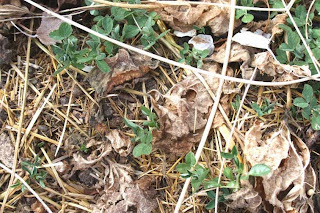Stillness is something that is very hard for many of us to embrace or practice. Often we wish for it, search for it but still fail to create space for stillness in our busy fast-paced lives.
Stillness of quiet wonder, observation, inhale.
The earth around us is asleep in December - the days are short, nights are long, and the life force of the world is being drawn in, inhaled by the earth - into its depth. Tree sap has drained to the roots, creatures are hibernating, leaves returned to the ground to cover it with a soft blanket and to give back nutrients and organic matter that was previously held high on branches.
The winds blow low now. They carry snow, leaves. The movement of living things are inward, towards containment. That observation of the living world is something to learn from - and use as a guide both in our own lives and in our work on the land, with living things and other beings.
December is decidedly not fast nor particularly alive. Seeds might germinate but will sit still and wait out for the pull of light that will return a few weeks after solstice. Animals contain their life forces: chickens stop laying eggs, milk production drops drastically, there are no births. It is puzzling to see grocery stores overflowing with eggs and milk at this time of the year. It is obvious that commercial animals do not experience the rest of the season, surrounded by artificial electrical lights, space heat, and fed un-seasonally rich feed.
Plants cease to grow in December - even those tucked away into greenhouses and cold frames. But winter harvest is still possible - greens seeded in August are now full size, though dormant, and ready for grateful plucking out of an unheated greenhouse. Surrounded by snow and freezing temperatures, greenhouse is just right for a prolific harvest of peas, mizuna, salad greens, kohlrabi, beet greens, kale, bok choy and mustard greens.
What is our work in the garden at this time of the year? Contemplation, evaluation of the last year ... I pull last delicious carrots from the nearly frozen soil, and wish I planned and planted better. Carrots, just as many other cold-weather crops, improve with cold weather. They make crunchy, juicy snack - and are bursting with tender sweetness. Sending them to school as snack is very rewarding! Cooking with them is unthinkable - they are so fresh and wonderful that any processing seems detrimental an undesirable.
Returning to the soil is the main work of this season, until the ground froze. As earth is taking its deep rest, its life force flowing inward, on inhale. Giving back in October and November was timely and harmonious with the inhale and restfulness.
Fallen leaves became mulch, soft soil blanket for garden beds and fruit trees. Compost, if you happen to make it, was welcomed into the sleeping soil, surrounding soil life with its nutritious bounty. Cover crops, planted much earlier in the season, are nearly dormant, their life drained into the depth of the soil, waiting for the signal to wake up.
Our garden scraps are still destined for the frozen compost pile - it is indeed that "compost happens" though at times it seems that it happens despite our efforts not because of them! A much better way is perhaps to place kitchen scraps under a thick layer of mulch, directly in the garden - but that is a delicate balancing act of keeping things neat, and mice and racoons out. This method is perhaps better suited for those of us who have some experience under their gardening belt. However, the rewards are many - nutrients are placed directly where they will be needed later, soil is being built with very little effort or labor, and one avoids dealing with frozen compost pile alltogether.
Snow is a very good fertilizer, and so are the eggshells. Snow brings nitrogen, eggs contribute calcium. Both are good for growing things. Watch snow fall... Collect egg shells....
Wooden potato-masher and a jar are the only tools needed. Crash the eggshells, stash away in a cool location until spring. Use the eggshell amendment when growing tomatoes, or house plants, or just any plants in the garden.
So that is the story of winter garden, and winter life. Contained, slow, quiet. Stillness all around. Under snow, leaves, mulch. Bringing our own lives into the contained slow pace is gardening for your own self in December. Stay warm and be well!







1 comment:
Glad to see you guys are still well!
- Louisiana
Post a Comment